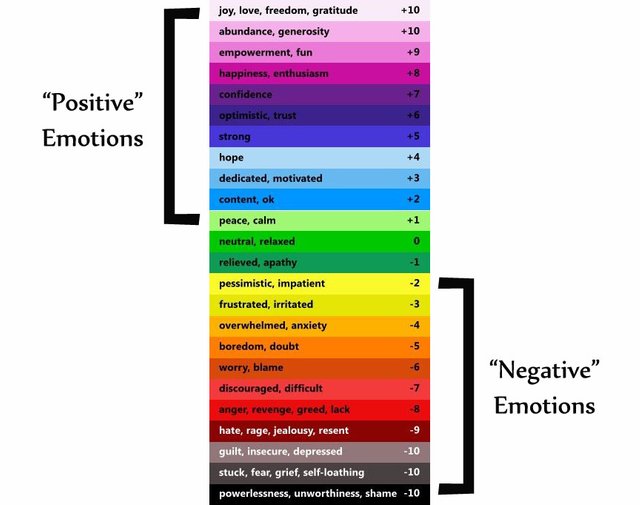Emotions (Part 1): What They Are, and How to Use Them
“Your thoughts and emotions will dictate the kind of life you will have.” -Jayson Engay
What are emotions? Have you ever heard a definitive answer to this question? Some will answer “chemical reactions”... Well, yes, but what purpose do they serve? It’s been supposed that they serve the fight or flight response, or inspire human bonding for the purpose of survival and procreation... OK, but obviously they are more nuanced and influential than that. Emotions are an ever-present aspect of our life experience that weigh heavily on our decision-making process in every moment.
Most of the time, emotions seem to be purposeless reactions to events in our lives. They treated as something to be enjoyed or avoided – indulged or repressed – but not something to be evaluated and utilized to a specific end. They are recognized as a source of pleasure or pain, but not a tool for improving our lives.
In furtherance of our effort to approach life from a position of seeking personal value, it behooves us to leave nothing on the table. If emotions can afford us an opportunity for improvement, we should understand what they are, and how to use them.
Emotions are personal guidance; a means for evaluating the nature and merit of our thought, and a powerful motivator to action.
Emotions are intrinsically linked to thought; they emerge in reaction to thought. We’ve all had the experience of feeling emotionally neutral, until remembering the big test, interview, or presentation tomorrow morning. Immediately upon having that thought, a flood of anxiety fills the body. Another example is how the thought of a special person can fill our stomach with butterflies, and inspire a deep longing to be close to them.
These thoughts need not always be conscious. Sometimes there are thoughts lingering just behind our conscious awareness - thoughts that have not undergone the formality of being mentally vocalized, but are present nonetheless. In this case, the emotion will get our attention even when the thought does not; and this is their primary value. We often call this a “mood” or a "nagging feeling", and it's emotion serving its purpose by cluing us in to the nature of our thoughts.
Emotional Motivation
Humans are motivated by emotion. All human action is an effort to move to a more pleasing emotional state. This is not just limited to personal issues like jobs or relationships, but to our broader worldview as well. Our political views, for instance, are rooted in this effort to feel better. We perceive that if government operated in line with our desires (by behaving as we wish, or by going away entirely), then we would feel happier, safer, etc., and we seek to bring that outcome about.
Here I will provide a chart that outlines the "Emotional Guidance Scale" (as presented in the teachings of Abraham Hicks). Items higher on the scale denote better-feeling emotions, while items lower on the scale denote more negative emotional states:
Sometimes this desire to move toward better-feeling emotions is not so obvious, like in the case of the person who abuses themselves. There doesn’t seem to be anything positive about that... But upon closer inspection, we can see that the person may be trying to move from feelings of guilt to the relief experienced by feelings of revenge against themselves. Even moving from one negative emotion to another is motivated by the desire for improvement. Rolling off a bed of nails into a mud pit is still a step in the right direction.
Unfortunately, much of our decisions are born of a fear. This is a very low emotional state, and though improvements sought through rage and resentment may serve to ease our pain temporarily, they are hardly the most desirable states to reside within on an ongoing basis. We can get trapped in a negative loop without a concerted effort to move higher on the scale.
Just as the acts of running or throwing are performed naturally and do not need to be taught, our use of emotional guidance also occurs naturally - even if we don’t understand it. However, there is much to be gained through knowledge and practice in these areas. Understanding this scale - and our ongoing efforts to move higher - will help us be more deliberate about the process, and improve the outcome of those efforts.
Since all action is motivated by a desire for emotional improvement, and all emotion is a reaction to thought, we can see that thought is the realm of causality. It is within our power to purposefully defer action and remain in the causal realm of thought, working toward a better state. We can use emotion as a gauge and progress upward along the scale via self-talk, sleep, meditation, etc., before taking action. In other words, we can wait until we're in a better-feeling place before expressing ourselves through actions, which have the power to shape our world directly.
Try using this scale to assess what you're feeling, and what emotional state you are trying to achieve by your intended actions. Use it to evaluate others. See if the described phenomenon accurately corresponds with your own experience and observation, and practice applying it in your life.
I hope this offers some preliminary insight into emotion’s role in the "thought --> emotion --> action" dynamic. In Part 2, we’ll investigate how emotions reflect the merit of our thought relative to truth, and how this can be used to attain optimally desirable results!
Thanks for checking in!
Brian Blackwell
If you’d like to explore relevant topics that support the ideas presented in this post, see the articles listed below:



we are born in fear, birth being always a trauma. I have a blog about it. But there is a bigger problem and which is that society rather cultivates that fear to the point that life itself becomes a psychosis.
I agree for the most part of what you say but in my view we do not think the way we want because thought is subjected to the law of polarity.
Psychosis indeed...
Could you please expand upon "...we do not think the way we want because thought is subjected to the law of polarity"?
that every word has its opposite and/or has a double meaning which only the mind can define. Life sustains polarities at all levels, there is a negative dot in the positive and positive dot in the negative. Personal choices thus reflect on experiences, level of knowledge and therefore are all perceptions of any given moment. Hence the imperative need to remain centered at all time in order to avoid the pitfalls of any polarized (divide and conquer) arguments and an inner fragmentation generating confusion. http://www.earthcustodians.net/blueprint.html
I think I'm following you in general, but I don't know what you mean by "we don't think the way we want". Do you mean we don't have control over our thoughts? Or that we fail, despite our efforts, because the polarity infects the purity of our thought?
The polarity can be useful because it leads the way to a direct opposite. So if we're feeling bad, and we notice that we're thinking "I'm a failure", we know which thought will move us up the emotional scale, namely "I'm successful". Then it's just a matter of finding thoughts that we actually believe which demonstrate our success.
Of course, polarity can be detrimental, as in the case of the person who rejects their Catholic upbringing because they perceive it to be full of lies and coercion, so they adopt atheist materialism; vehemently opposing anything spiritual, and thus tossing out both bathwater and baby in a single, heavy-handed toss. I believe this is a case where you would counsel remaining centered and evaluating things more lucidly.